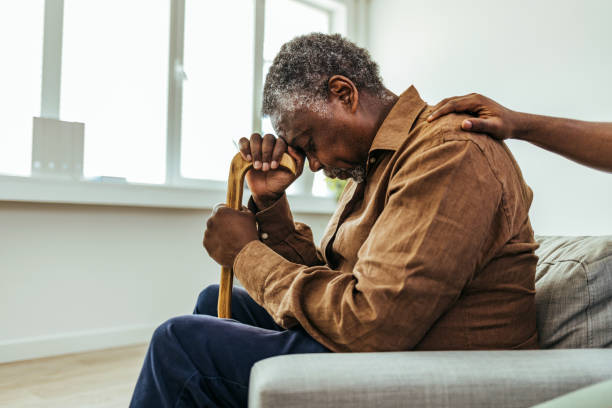Introduction

Are you a Parkinson's disease patient struggling with long-term fatigue and daytime sleepiness? You're not alone – navigating living with this condition can be challenging. Creating an effective plan to manage your symptoms requires understanding their root causes.
This blog post aims to explore how Parkinson's disease is related to feelings of exhaustion and daytime sleepiness and provide information on possible treatments and strategies for managing these symptoms. This post provides information on fatigue and offers techniques that can help enhance your overall well-being.
What is Parkinson's disease?
A person with Parkinson's disease experiences chronic and progressive neurological symptoms that affect their ability to move. It is estimated to affect nearly one million people in the United States alone, and symptoms can range from tremors to difficulty with movement and balance. One of the typical symptoms of Parkinson's disease is fatigue.
Overview of fatigue and daytime sleepiness as common symptoms in PD patients
Fatigue and daytime sleepiness are common symptoms experienced by patients with Parkinson's Disease (PD). These symptoms can significantly impact how individuals live daily, often leading to difficulty performing simple tasks. Fatigue is typically described as an overwhelming feeling of tiredness accompanied by physical and mental exhaustion. Sometimes, even after sleeping well at night, you may feel tired and want to nap during the day.
This is called daytime sleepiness, and it happens a lot. Both fatigue and daytime sleepiness can be caused by several factors associated with PD, such as changes in dopamine levels and medications used to manage symptoms. PD patients may also suffer from poor sleep quality due to mobility issues or other medical conditions. This can lead to more severe fatigue and daytime sleepiness, making it difficult to perform regular activities.
PD patients are encouraged to practice good sleep hygiene to cope with fatigue and daytime sleepiness. This includes avoiding caffeine near bedtime, limiting alcohol intake, exercising regularly, and maintaining a consistent sleep schedule. Keeping track of medications and their side effects is important. This can help the patient identify any medications contributing to fatigue or daytime sleepiness and work with a doctor on adjusting dosages or finding alternative treatments.
Tips for managing fatigue and sleepiness

Different strategies can assist patients in handling these symptoms, so, fortunately, they exist. Keep in mind these important factors.
1. Get enough restful sleep:
Finding enough restful sleep is key to managing fatigue and daytime sleepiness. It can help reduce the symptoms of Parkinson's disease and other health conditions that might contribute to fatigue or drowsiness. Some things you can try include:
-
To improve your sleep, establishing a regular bedtime routine is recommended. This includes consistently going to bed and waking up simultaneously every day.
-
Avoiding caffeine, nicotine, alcohol, and other stimulants in the evening - Creating a comfortable sleep environment (e.g., using light-blocking curtains or an eye mask to reduce distractions).
-
Regular exercise can increase your energy and help you better manage fatigue. Moreover, it can enhance the quality of your sleep, resulting in more peaceful and revitalizing rest.
-
It is advisable to strive for 30 minutes of aerobic exercise 3-5 times per week, in addition to strength training.
2. Eat a healthy diet:
A nutritious, balanced diet is important in managing fatigue and daytime sleepiness. Incorporating whole grains, lean proteins, fruits, and vegetables into your meals can help boost your energy levels and mood and lower inflammation. A healthy diet is recommended to be consumed. Avoid processed foods with added sugars or unhealthy fats, which can lead to excessive daytime sleepiness.
Additionally, staying hydrated is essential for managing fatigue and drowsiness. Being dehydrated can cause your body to be sluggish and make it difficult to stay alert during the day. To stay hydrated, it's recommended to drink at least eight glasses of water a day and stay away from substances like caffeine that can cause dehydration.
Reducing fatigue and drowsiness can also be achieved by effectively managing stress. Stress can harm your body, leading to exhaustion and poor sleep quality. Engaging in enjoyable activities or utilizing relaxation techniques such as deep breathing or meditation can lower stress levels.
Finally, talking to your doctor about medications that may help manage fatigue and daytime sleepiness is important. Several medications can help reduce symptoms, including antidepressants and stimulants. Your doctor can recommend the best option based on your needs.
3. Talk to your doctor:
To address fatigue and daytime sleepiness, it is crucial to discuss it with your doctor. These symptoms can have different causes among individuals, so it is necessary to identify the root cause before taking steps to alleviate them. Your doctor can assess any underlying conditions that might be causing or contributing to these symptoms and recommend appropriate treatments.
For example, your doctor might suggest lifestyle changes such as getting more restful sleep, exercising regularly, or eating a healthy diet. They may also recommend medication to help reduce fatigue and daytime sleepiness symptoms. Furthermore, they might recommend you to a specialist for further assessment if required. Remember that finding a solution may take time, as no easy fixes exist.
4. Seek Support:
If you find it difficult to manage fatigue and daytime sleepiness alone, seeking support from loved ones or joining a support group can be beneficial. Talking about your challenges with others who may be experiencing the same issues can help you feel less isolated and offer a sense of community. Furthermore, seeking emotional support from loved ones can assist you in better managing your symptoms.
By reducing fatigue and daytime sleepiness, you can improve your quality of life and function better in daily activities. Remember that fatigue impacts people differently, so finding the best management method for yourself is crucial. Ask your doctor for additional support and advice if you feel overwhelmed or frustrated.
Finally, remember that with the right strategies and support, you can manage fatigue and daytime sleepiness in Parkinson's disease patients.
Neurological and physical factors contributing to fatigue and daytime sleepiness
Fatigue and daytime sleepiness are common symptoms experienced by individuals with Parkinson's disease (PD). This can be attributed to several neurological and physical factors often accompanying the condition. These include:
-
Impaired dopamine production in the brain - Dopamine is a chemical messenger responsible for controlling movement, and fatigue and sleepiness can result when it is lacking or not functioning properly.
-
Some medications used for Parkinson's disease treatment may lead to feeling sleepy or having lower energy.
-
Poor sleep quality - Sleep disturbances such as nighttime insomnia and waking up frequently at night are common in PD patients and linked to increased fatigue and daytime drowsiness.
-
Reduced aerobic fitness - It has been shown that individuals with PD often have lower aerobic fitness levels, which can lead to fatigue and general feelings of tiredness.
-
Individuals with Parkinson's Disease frequently experience fatigue and daytime drowsiness due to mental health challenges such as depression, anxiety, and apathy.
Coping Strategies for Fatigue and Daytime Sleepiness in Parkinson's Disease
1. Plan and prioritize:
Planning your day and prioritizing activities is crucial for managing fatigue and daytime sleepiness in Parkinson's disease. Structure your day with a routine that includes regular exercise, healthy meals, adequate rest, and leisure time. Allow enough time for tasks so you don't overexert yourself.
2. Exercise:

If you have Parkinson's disease and struggle with fatigue and daytime sleepiness, regular exercise may help you manage and reduce these motor symptoms. Exercise can improve sleep quality by enhancing energy levels and physical health. For the most suitable exercise plan for your needs, it is advised to consult with a doctor or physical therapist.
3. Stay hydrated:
Drinking fluids is essential for maintaining energy levels throughout the day and reducing fatigue and daytime sleepiness in Parkinson's disease. Try drinking at least 8-10 glasses of water daily and other healthy drinks such as herbal teas or fresh vegetable juices.
4. Take regular breaks:
Allowing yourself to take regular breaks throughout the day can help reduce fatigue and daytime sleepiness in Parkinson's disease. Rest, stretch your body, or meditate briefly before returning to activities.
5. Reduce stress:
Stress can contribute to fatigue and daytime sleepiness in Parkinson's disease, so finding ways to reduce stress levels is important. You can try deep breathing, yoga, or mindfulness meditation to relax.
6. Get enough sleep:
If you have Parkinson's disease, it's important to prioritize getting enough good quality sleep to reduce fatigue and daytime sleepiness. Aim to get 7-8 hours of sleep every night for increased daytime energy. If you're having trouble sleeping or wish to know more about healthy sleep habits, consult your doctor.
Following these tips can help reduce fatigue and daytime sleepiness in Parkinson's disease, allowing you to make the most of each day.
Strategies for improving sleep quality and managing sleep disturbances
Several strategies are available to help improve the quality of your sleep and manage sleep disturbances if you have Parkinson's Disease.
1. Stick to a regular sleep schedule: Maintaining a regular sleep schedule by going to bed and waking up at the same time every day, even on weekends, is crucial for a healthy sleep pattern.
2. Avoid caffeine: Caffeine can interfere with sleep patterns and may increase feelings of fatigue during the day, so it is best to limit caffeine intake before bedtime.
3. Take a nap: Take a 30-minute nap during the day to help battle fatigue and sleepiness. Taking naps close to bedtime may disrupt your sleep at night, so it's best to avoid doing so.
4. Exercise regularly: To maintain good health, it is advised to participate in 30 minutes of moderate physical activity every day. Additionally, regular exercise can enhance the quality of your sleep.
5. Improve your sleeping environment: Ensure your bedroom is quiet, dark, and well-ventilated. Also, avoid consuming anything stimulating, such as electronic devices or television, before bedtime.
FAQ's
Is it normal for someone with Parkinson's to sleep all day?
Yes, it is normal for someone with Parkinson's disease to experience excessive daytime sleepiness and mental fatigue, leading to sleeping more than usual during the day. If you find yourself sleeping excessively or for long periods during the day, it may indicate an underlying medical issue like depression, insomnia, or obstructive sleep apnea. It is crucial to discuss any changes you notice in your sleep patterns with your doctor.
How do you deal with sleep problems with Parkinson's?
You can use several strategies to help deal with sleep problems caused by Parkinson's disease. These include sleeping regularly, avoiding caffeine before bedtime, taking naps daily, exercising regularly, and improving your sleeping environment.
Is there a cure for daytime sleepiness?
There is no cure for daytime sleepiness, but you can manage the symptoms by getting enough quality sleep, following a healthy lifestyle, reducing stress levels, and taking regular daily breaks. If you still struggle with fatigue and daytime sleepiness, consult your doctor for other options.
What stage of Parkinson's is sleeping all the time?
Individuals with Parkinson's disease may experience daytime sleepiness and fatigue at any stage. It is crucial to discuss your persistent fatigue with your doctor, so they can assist you in finding suitable measures to manage it. Your doctor can provide valuable recommendations on handling fatigue, sleep disorders, and underlying medical conditions, which can significantly improve your quality of life.
Conclusion
By reading this article, you can better understand how Parkinson's disease can affect your energy levels and sleep. To help improve these symptoms, it is recommended that you discuss any changes in your sleep patterns with your doctor. Furthermore, implementing basic practices such as following a consistent sleep routine, avoiding caffeine before bedtime, taking daytime naps, exercising frequently, and enhancing your sleep environment can help improve your overall health and well-being.

